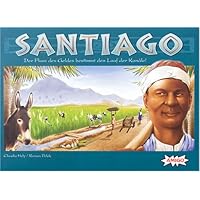
Average Reviews:

(More customer reviews)I felt like I had to write this review after seeing how much I disagreed with the only other review on this site. This is a great game! A brief summary of the game play is that a number of crop tiles are turned over and players bid on which one they would like to place on the board. After that is done the player who bid lowest (and chose last) is now in charge of irrigating the crops. The other players take turns attempting to bribe this person so that their crops get water. The person in charge of water can accept one bribe or choose to let your crops die, so you better make a good offer. There is obviously a lot more going on than I can explain in 4 sentences.
One of my main criteria in judging a game is the amount of downtime. Waiting for someone to make a decision that doesn't affect you can be excruciating. There is none of that here. The decisions are quick and have a lot of affect on all the other players. It is a bidding game at heart but in the bidding rounds each person gets one bid only so you don't waste time going back and forth raising each other $1. A byproduct of each decision affecting all players is that there is a lot of player interaction. There are many deals to be made in this game. You won't be disappointed.
Click Here to see more reviews about: Santiago
Appropriately enough for the hot summer we've had this year, the game is about sufficiently watering the fields. And not only watering them; the fallow ground must be cultivated too. To accomplish this, a number of tiles denoting various plantation types come into the game each round. The tiles are auctioned off such that each player gets one, and the tiles then placed onto the game board along with an ownership marker that also indicates how plentiful the tile's yield will be. Whoever bid the lowest in each round gets to be the canal overseer and decide where a canal will be built that round. The other players may make suggestions to help the canal overseer decide, and back up their suggestions with money. The final decision is always wholly up to the overseer, though. At the end of each round, players determine what the water supply situation looks like. Should a plantation not be sufficiently watered, its production drops dramatically; should it happen more than once, then that plantation may revert to fallow ground. At game's end, naturally only the cultivated land counts. Each plantation is counted according to type, the bigger the better. But since the ownership markers play a role as well, the same plantation can give drastically different points for different players. Players: 3-5 Ages: 10 and up Playing Time: 90 minutes

0 comments:
Post a Comment